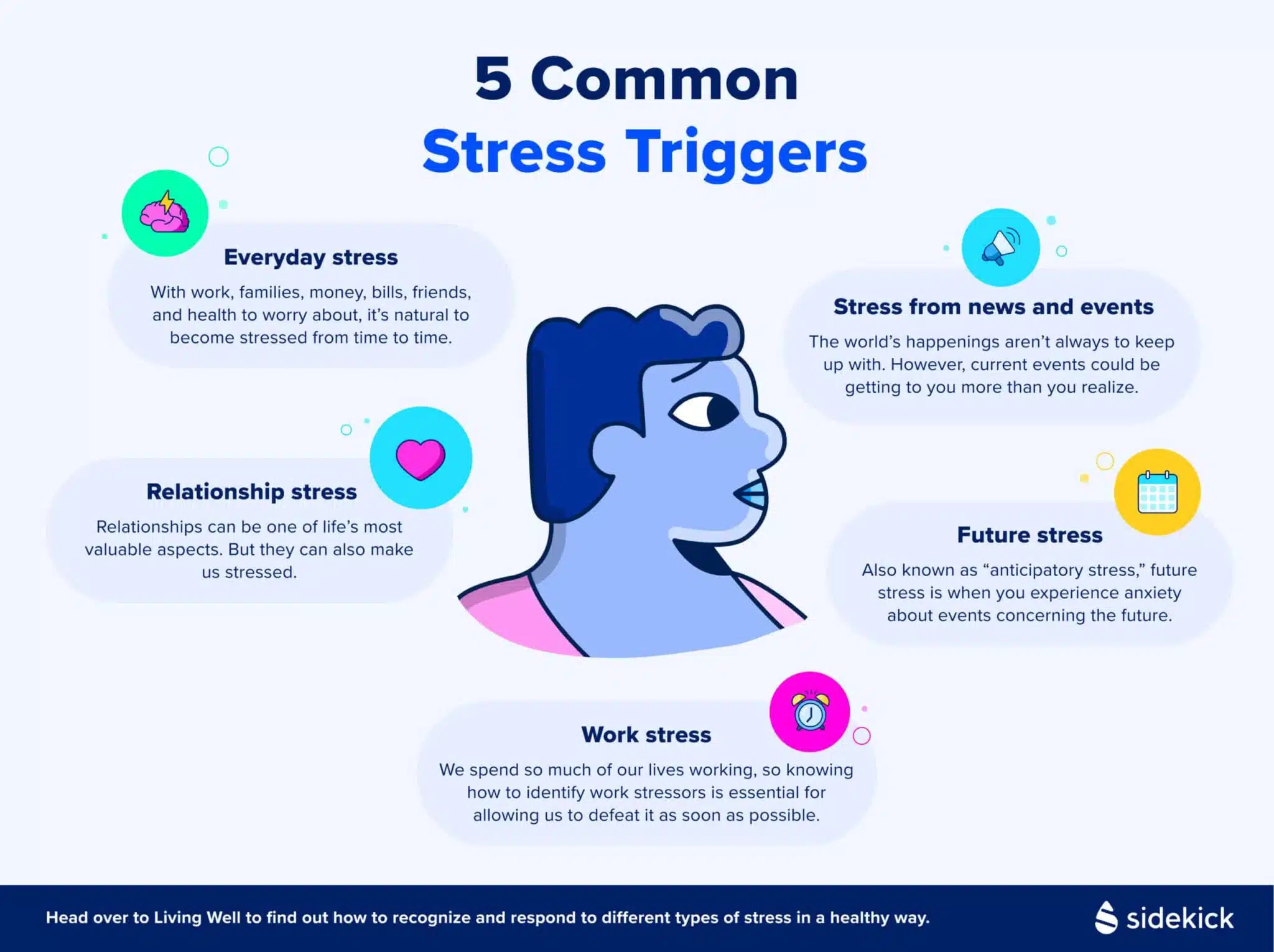|
Getting your Trinity Audio player ready...
|
If you’ve ever experienced stress, you’ll know that sometimes it can feel exhilarating; heading out on a first date, competing in a sport, getting ready on your wedding day, or putting yourself forward for a promotion. These are all situations where you might feel stressed, but in a good way. Psychologists call this “eustress”: stress that leads to a positive response.
But sometimes, stress can feel the exact opposite of exhilarating, and instead of experiencing eustress, we are filled with its darker side: distress.
Our bodies might react to distress in the same way as with eustress, such as a pounding heart, racing thoughts, feeling sick to the stomach, heightened alertness, and getting sweaty, but along with these, we also feel uncomfortable, overwhelmed, and maybe panicky.
With so many things to deal with in modern life, it’s natural to become stressed from time to time. But how much stress is too much? And when does stress start to become a problem for our health?
We delve into some common life stressors and provide you with advice and tips on how to deal with them in a healthy way.
What is stress?
You may have heard of the “fight or flight response,” which is our body’s way of getting ready to either fight the thing that’s causing us stress or to run away from it.
If you could see what was happening inside your body when something stressful occurs, you’d see the release of stress hormones like cortisol and adrenaline.
Cortisol and adrenaline help prepare your body for danger in several ways, such as speeding up your heart rate, increasing your breathing, alerting your immune system response, making it easier for your muscles to use glucose, and restricting your non-essential functions to be able to deal with a potentially dangerous situation.
There are three main types of stress:
Acute stress
Acute stress is short-term and can either be positive, like sport competition, first date, or wedding day-type stress, or negative, such as when you’re behind on a deadline, your partner says you need “to talk,” or you get a call from your child’s school asking you to come in.
Once the stressful situation passes, your body usually goes back to normal.
Episodic acute stress
This term is used to describe frequent occurrences of acute stress. Maybe you often find yourself feeling stressed about something that has happened, or you suspect will happen. You might live in a state of hyper-alertness or feel like you’re always dealing with a different crisis.
Chronic stress
Chronic stress is stress that persists over a long period of time and can gradually wear a person down. Such problems could be being very unhappy in a job or being in a dysfunctional relationship with a partner or family member.
What is the impact of stress on health?
When stress starts to become more frequent or continues for a long period of time, it can lead to health issues. And sometimes, a person may not even realize that their body is being deeply affected by stress.
Left unnoticed, stress can show up in your body in the following ways:
- Anxiety and/or depression
- Insomnia or sleep issues
- Lower sex drive
- Digestive problems
- Poor eating habits
- High blood pressure
- Weakened immune system
- Tension headaches
Stress can also lead to the worsening of existing conditions, such as eczema, rheumatoid arthritis, asthma, and diabetes.
To avoid the long-term physical and mental health problems that prolonged stress can bring, it’s important to recognize what might be causing you stress in the first place.
What are some common stress triggers?
Stress can pop up from anywhere, sometimes when you least expect it. Knowing how to recognize when something brings you stress will give you the power to manage it.
Here are some common stress triggers and how they might be affecting you.

Everyday stress
School doesn’t quite prepare us for the stress of adult life. With work, families, money, bills, friends, and health to worry about, it’s natural to become stressed from time to time. Signs of everyday stress include:
- Feeling irritable, angry, and easily annoyed
- Anxiety and nervousness
- Unable to switch your mind off
- Unable to enjoy your life
- Sleep problems
- Eating issues
We can’t often control the things in life that bring us stress and anxiety, but we can control our reactions to them. We can also make small lifestyle changes to better equip ourselves to deal with them. Some ways to cope with everyday stress are:
- Opening up to friends and family about your worries. Sometimes, simply talking about stressors can help ease them.
- Looking after your body will help keep your mind in check. Regular exercise can reduce the negative effects of stress and increase endorphins – the body’s natural stress reliever.
- Journaling can be a great way of getting negative thoughts and feelings out of your body. Also, practice putting to paper the things that make you feel happy and grateful. Focusing on the positive can take power away from the negative.
- Practicing mindfulness and meditation can really make a difference if life is bringing you down.
Relationship stress
Whether it’s romantic, friendship, or family, relationships can be one of life’s most valuable aspects. They can bring us joy, love, safety, and support, and can help us develop and grow. But they can also make us stressed.
If you find yourself worrying about your relationships more than usual, it might be time to think about why. Some tell-tale signs that you’re dealing with relationship stress could be:
- You’re disagreeing with your partner, family member, or friend a lot.
- You suddenly find your partner, family member, or friend irritating.
- You spend a lot of time worrying about your relationship and have feelings of paranoia.
Consider the following tips to reduce stress in your relationships:
- Communication is key in any relationship. Try to find a way to talk about anything that might be bothering you. If you’re uncomfortable bringing a subject up out of the blue, a good idea is to have regular check-ins that give you both the chance to discuss any issues that may come up.
- Look for the good in the other, as opposed to focusing on their weaknesses.
- Learn to check in with yourself. Self-care acts such as journaling might help you connect with your mind and bring you some peace.
Mindfulness and meditation are also great ways to manage stress. Our Sidekick programs are full of meditation and mindfulness tips to help you look after your well-being. You can read more about that here.
Please note that if you’re in a relationship that’s causing you mental, emotional, or physical harm, it’s important to reach out for support. Search online for support networks in your area.
Work stress
In the US, 83% of workers report suffering from stress, with 25% saying that work is the main cause of stress in their lives. We spend so much of our lives working, so knowing how to identify work stressors is essential for allowing us to defeat it as soon as possible.
Signs of work stress might look like this:
- Calling in sick more than usual
- Feeling anxious or worried
- Sleep problems
- Not being able to concentrate at work
- Skin breakouts
- Headaches
- Body tension
If any of these sound familiar, you may be experiencing work stress. So, before you let it get the better of you, try mastering some of these tips:
- Speak to your manager or HR representative about possible changes that could be made to reduce your stress.
- If you can, practice leaving work at work. Establish some boundaries so that you’re not taking work home – physically or mentally. For example, once you’ve finished work, make a habit of not checking your emails and establish set hours that you work with colleagues.
- Taking the time to recharge is essential. Make the most of your evenings and weekends, and don’t let your vacation days go to waste.
- Make a habit of going outside on your lunch break, going for short walks, and taking the time to enjoy your lunch – the small things really do count.
Stress from news and events
The world’s happenings aren’t always to keep up with. However, current events could be getting to you more than you realize, especially if the following signs of stress sound familiar:
- Headaches
- Fatigue or sleep disruption
- Sweating
- Changes in appetite
While there are many things to feel sad and angry about in the world, here are some tips that we find helpful:
- Limit how much news you watch, listen to, and read. If you know the news triggers feelings of stress, removing the triggers is a large part of the work.
- Make time for yourself by spending time with family or doing things you enjoy.
- If you feel passionate about the state of current events, get active instead of getting stressed. Try volunteering and attending events to meet like-minded people. Learning to channel your stress in healthy ways might prevent it from bleeding into your personal life.
Future stress
Also known as “anticipatory stress,” future stress is when you experience anxiety about events concerning the future. Small things like a work presentation, a doctor’s appointment, or a job interview could bring up stressful feelings. Bigger worries about the future of your career, finances, relationships, and health could also trigger stress. And that could cause any of the following:
- Racing thoughts
- Feeling tense and/or nervous
- Sleep problems
- Sweating
- Feeling irritable or moody
- Difficulty concentrating
Try some of these stress-management tips to ease your negative feelings:
- Try to stop thinking in “may”s and “might”s – no one knows what’s going to happen in the future.
- Look after yourself in terms of exercise, nutrition, and sleep while also enjoying yourself, relaxing, and spending time with others.
- If you’re constantly worried about the future, it’s hard to be in the present moment. Learning to stay present is key to mindfulness and meditation. If you feel your mind spinning about the future, bring yourself back, notice your surroundings, focus on your breathing, and take a moment to let the feeling pass. Breathwork can have a positive impact on your central nervous system. There are many breathwork techniques you can find in Sidekick’s programs that could help you feel more control over your mind and body.
Lastly, know that stress can be managed. What’s important is knowing your triggers. Our Sidekick programs can teach you how to identify yours and help you find healthy ways of dealing with them.
Check out our library for more useful articles on stress management and mindfulness – discover more here.













